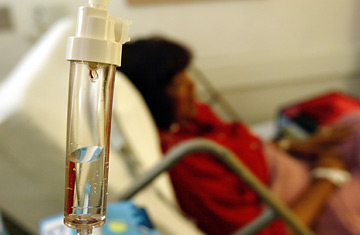
A breast cancer patient receives a chemotherapy
It might not seem like good news. A paper in this week's New England Journal of Medicine (NEJM) shows that one of the most common breast cancer chemotherapy drugs doesn't work for probably half the women taking it. A separate study, published Thursday in the online journal Breast Cancer Research (BCR), suggests that about 60% of young breast cancer patients, aged 40 and under, are getting far less benefit from their chemo courses than other patients.
But good news it is, say the researchers behind both papers. Knowing which drugs work — or don't work — for which patients will open the door to far more effective treatment programs than those prescribed today. "Traditionally the only criterion we've used to determine whether to give someone chemotherapy has been the odds of metastasis" — that is, whether the cancer will spread through the body — "and not the odds of whether it will work," says Daniel Hayes, a University of Michigan oncologist and the lead author of the NEJM paper. "That's pretty crude." At the Leiden University Medical Center in Holland, Sven Mieog, an author of the BCR study, says these studies are the first step toward a more sophisticated approach to cancer care: "This is taking us toward personalized treatments, tailor-made treatments," he says.
The two new studies this week, along several others from the last five years, demonstrate that certain markers on breast cancer cells can help doctors predict the effectiveness of chemotherapy in particular patients. There's a reason breast cancer patients take the drugs they do. Adjuvant chemotherapy, as it's called when a patient gets cancer-fighting drugs as well as surgery, has helped bring about a tremendous decline in breast-cancer mortality rates since the 1970s. But, as any cancer patient will tell you, chemo is not only expensive but often has horrendous side effects. Depending on the chemicals, patients can expect nausea, hair loss and increased risk of infection.
The paper in BCR involved 480 patients, aged 40 and under, in Europe. Among them, the women whose cancers were estrogen-receptor-positive (ER+) — meaning that the patients had a high proportion of cancer cells needing estrogen to grow — responded to chemotherapy programs less favorably than those with estrogen-receptor-negative (ER-) cancers. The NEJM took a larger sample: 1,322 North American women whose cancer had spread to the lymph nodes. All patients got four cycles of AC chemotherapy (two drugs: Adriamycin and Cytoxan); half of the women got an additional four courses of the drug paclitaxel, better known as Taxol. That study found that adding Taxol benefited women only when their cancers were ER- or HER2+ — that is, overexpressing the HER2 protein, a sign of a more aggressive cancer. For these women, Taxol boosted the chance of surviving disease-free for 10 years by 30% to 50%. But for roughly half the patients in the study whose cancer cells were both ER+ and HER2- (the most common type of breast cancer) the drug did no discernible good. That's significant because, right now, most women in the Western world are prescribed Taxol, or another in the taxane family of drugs, when they get adjuvant chemotherapy for breast cancer.
The authors of neither study advocates big changes to clinical practice just yet — as Hayes cautions, the stakes are high, and women can't stop treatment based on early findings — but the future of patient-specific breast-cancer therapy does look bright. In addition to drugs like Tamoxifen, which interferes with estrogen and slows or stops the growth of ER+ cancers, and Herceptin, which targets HER2+ cancer cells, individually tailored chemo treatments could further boost each woman's odds of recovery, and, of course, prevent the costs and side effects of unnecessary, unhelpful treatments. The era of personalized care could come soon, Hayes says: "I think the good news is that, for patients five years from now, this is a harbinger of things to come."
